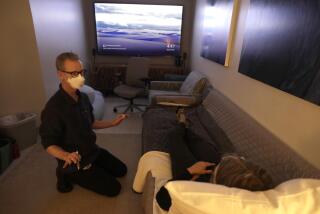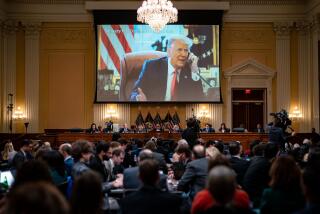Panel to Seek Change on Iraq
- Share via
WASHINGTON — A commission backed by President Bush that is exploring U.S. options in Iraq intends to propose significant changes in the administration’s strategy by early next year, members say.
Two options under consideration would represent reversals of U.S. policy: withdrawing American troops in phases, and bringing neighboring Iran and Syria into a joint effort to stop the fighting.
While it weighs alternatives, the 10-member commission headed by former Secretary of State James A. Baker III has agreed on one principle.
“It’s not going to be ‘stay the course,’ ” one participant said. “The bottom line is, [current U.S. policy] isn’t working.... There’s got to be another way.”
If the panel recommends overhauling Bush’s approach to Iraq, it could give a boost not only to critics of current policy but also to officials in the administration who have argued for broad changes.
“There’ll probably be some things in our report that the administration might not like,” Baker said in a television interview last week.
It’s unclear how willing Bush is to change his strategy, which focuses on improving security in Baghdad, training Iraqi security forces and pressing the Iraqi government to forge a political agreement among warring factions.
Progress on all those fronts has been slow, and Bush last week said he was open to ideas.
“My attitude is: Don’t do what you’re doing if it’s not working -- change,” Bush said at a news conference.
When the panel was formed in March, some administration officials hoped it would produce a bipartisan endorsement of existing policy. But as sectarian violence in Iraq has worsened, more Republicans in Congress -- and privately some administration officials -- have become receptive to alternatives.
The Baker panel, called the Iraq Study Group, was formed in response to a proposal by members of Congress. Nevertheless, Baker sought -- and won -- Bush’s endorsement.
Other members include former Rep. Lee H. Hamilton (D-Ind.), who also served as co-chairman of the commission investigating the Sept. 11 terrorist attacks; retired Supreme Court Justice Sandra Day O’Connor; former Rep. Leon E. Panetta, a California Democrat who was President Clinton’s chief of staff; and former CIA Director Robert M. Gates.
In its most recent closed-door meetings, the commission focused on two options drafted by experts outside the government.
One, titled “Stability First,” calls for continuing to try to stabilize Baghdad, boosting efforts to entice insurgents into politics, and bringing Iran and Syria into plans to end the fighting.
The other, called “Redeploy and Contain,” goes further. It calls for a gradual, phased withdrawal of American troops to bases outside Iraq where they would be available for strikes against terrorist organizations anywhere in the region.
The experts also prepared an option called “Stay the Course, Redefine the Mission,” and an alternative urging a quick U.S. withdrawal, but the panel appeared less interested in those plans, participants said.
The options were first reported last week by the New York Sun.
Baker and other commission members refused to confirm the substance of the options and emphasized that the panel had made no decisions. But Baker signaled the thrust of the panel’s deliberations in several television interviews last week.
“Our commission believes that there are alternatives between the stated alternatives, the ones that are out there in the political debate of ‘stay the course’ and ‘cut and run,’ ” Baker said.
The former secretary of State, who was a longtime aide to former President George H.W. Bush, also said he favored reaching out to Iran and Syria.
“I personally believe in talking to your enemies,” he said. “Neither the Syrians nor the Iranians want a chaotic Iraq ... so maybe there is some potential for getting something other than opposition from those countries.”
Bringing Iran and Syria into negotiations would require significant changes in U.S. policy.
“To bring them in, we need to stop emphasizing things like democracy and start emphasizing things like stability and territorial integrity,” said James Dobbins of the Rand Corp., a former U.S. envoy to Afghanistan. “We need to stop talking about regime change. It’s unreasonable to think you can stabilize Iraq and destabilize Iran and Syria at the same time.”
The Iraq Study Group said Dobbins was one of its advisors. Dobbins refused to talk about the panel’s work, and said he was giving a personal opinion. Other participants described the commission’s discussions on condition they not be identified because Baker had asked them to keep the work confidential.
Baker, promoting a new volume of his memoirs in a recent flurry of television interviews, including an appearance on Comedy Central’s “The Daily Show With Jon Stewart,” offered his views on issues under consideration by the panel. He also appeared on ABC’s “This Week With George Stephanopoulos,” PBS’ “The NewsHour With Jim Lehrer” and PBS’ “The Charlie Rose Show.”
After the publicity blitz drew quiet grumbles from other panel participants, Baker canceled a scheduled breakfast with newspaper reporters and declined a request from The Times for an interview.
In his interviews, Baker said he did not support calls for an early withdrawal of U.S. troops. “I think that if we picked up and left right now that you would see the biggest civil war you’ve ever seen,” he said.
He also said he did not agree with proposals to divide Iraq into three states for Sunni Arabs, Shiites and Kurds. “Most all the experts we’ve talked with think that might ... trigger a civil war.”
And instead of trying to bring democracy to all nations in the Middle East, he said, the U.S. should define success as achieving “representative government, not necessarily democracy.”
Another participant, speaking on condition of anonymity, said the panel was considering whether the United States should warn the Iraqi government to get its “act together or else,” a threat to withdraw troops unless the government’s performance improved.
An administration official was skeptical that the panel would uncover new policy options, but said the White House would welcome ideas.
“If an independent group like the Baker panel can come up with some good ideas, we’re all for it,” he said, speaking on condition of anonymity because his comment had not been approved.
Participants in the Iraq Study Group said an additional goal was to identify options that Republicans and Democrats could endorse.
The commission is scheduled to meet again in mid-November. It hopes to deliver a report to Bush, Congress and the public by early 2007.
Some members of Congress, including Senate Armed Services Committee Chairman John W. Warner (R-Va.), asked Baker to provide a report after next month’s congressional elections, but Baker reportedly concluded that he would need more time to build a bipartisan consensus on significant recommendations.
Baker and Hamilton noted that the panel had consulted more than 150 experts, including representatives of Iran and Syria, and that its members spent four days in Iraq this year.
Administration officials also have briefed the panel.
“You can’t come out of those briefings and not have a sense that things are in real bad shape,” one participant said. “The bottom line is, it’s not working. They know that. And they know that time is not on their side.”
--
Times staff writers Paul Richter and Peter Spiegel contributed to this report.
More to Read
Sign up for Essential California
The most important California stories and recommendations in your inbox every morning.
You may occasionally receive promotional content from the Los Angeles Times.











